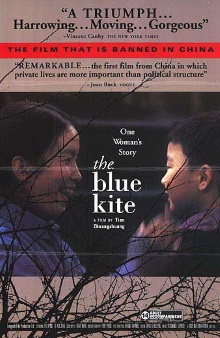
This one was once again an entry selected by my wife by a director belonging to China’s Fifth Generation of filmmakers, Tian Zhuangzhuang. This is the first time I’ve watched one of his films and he seems less internationally known than his peers but The Blue Kite seems to be a highly regarded film and predictably was banned in China following its release due to its critique of the policies of Mao Zedong.
Tietou is a son who is born to a couple Lin Shaolong and Chen Shujuan shortly after the Communists win control of China in the early 1950s. The mood is joyful and hopeful but it doesn’t last. A colleague submits some suggestions on the behalf of Shaolong and his friend Li at the library where they work as part of the Hundred Flowers Campaign which is used against them when the party decides to stifle all criticism. Shujuan’s elder brother is an army pilot who gradually loses his eyesight and loses his girlfriend who is pressured to have affairs with senior party members. Shaolong is sent to a labor camp to be reeducated and dies there. Shujuan eventually marries Li who confesses his role in writing a report that contributed to Shaolong being sent away but Li dies as well due to illness and malnutrition while the countryside is ravaged by famine. The family’s travails however are far from over as next comes the Cultural Revolution in which Tietou finds himself being both one of the accusatory revolutionary youth and a victim.
This film bears a strong similarity with To Live, covering as it does the suffering of a single nuclear family through the tumultuous events of the 20th century. Of the two, I judge To Live to be the more emotive film and with a better grasp of powerful drama. Tian films The Blue Kite through the eyes of the child Tietou who is frequently unaware of the wider implications of what happens to his family. The result is a film that seems to hold the audience at arm’s length and sometimes feels like a dispassionate documentary. Still there is a kind of quiet horror in this objective telling of events and the two families differ in one important respect. While Fugui’s family in To Live are peasants who act mostly out of fear of the powerful and try to keep their heads down, many of the characters in The Blue Kite are important contributors to the Communist Revolution and at the beginning at least are enthusiastic supporters. This makes the party’s betrayal all the more biting when it becomes obvious that previous service and loyalty offers no protection when it is your turn to be targeted.
For my part, while this is an excellent film in all respects and is well worth watching, I confess to being a bit bored by now of this ground-level view of the human damage done by the Communist rule in China. The blurb from the poster I put here praises it as being a film in which private lives are more important than the political structure but it made me realize that I’ve never seen a film that focuses on the movers and shakers of the Chinese political stage in a critical way. I would in fact be very interested in watching a well made film that shows Mao and other party leaders coming up with these cruel ideas and how they deal with the fallout when they manifestly fail to work. I was also frustrated that they often talk about the labor reeducation camps but they never actually show the hardship of daily life within them. I suspect that one problem with this is the difficulty of showing such a life in a bad light since it is very easy to interpret a rigid schedule of tough physical labor as a good thing.
Another similarity between The Blue Kite and To Live is that both share the same general mental attitude in the face of the horrors: a kind of sullen and passive fatalism. Perhaps this is a very Chinese attitude and perhaps this is the only attitude that the people can have if they are to survive. But it draws from such a narrow range of emotions that it is inhuman. Where is the anger, the outrage at all this injustice? Where is the disgust for the hypocrisies of the Communist leadership? Where is the sadness, not for themselves but for their country and for betrayed ideals? I want to see people not just surviving but trying to do something about it. Surely there are those who fled to other countries, America, Europe, even Taiwan or Southeast Asia and tried to help others do so. Surely there are those who tried to spread the truth about how awful all these policies are. Where are their stories? Watching this, I realized the value in Quentin Tarantino’s Inglorious Basterds. It would be so cathartic and so satisfying to watch a hero walk up and machine-gun the fuck out of Mao Zedong.
Of course, all this is just wishful thinking and this was the harshest criticism that they dared to make in the 1990s and the filmmakers involved were heavily censured for it. Even worse is that, and I doubt that any of the Fifth Generation directors could have imagined it at that time, it turned out to be pretty much the peak of what criticism could be possible. Even as China has grown richer, state control of the media has only increased, both in severity and in sophistication. Since my father-in-law watches Chinese dramas, I know that they’re full of the heroics and accomplishments of Mao Zedong and I despair of the Chinese in general ever coming around to seeing him as the great villain of history that he is.